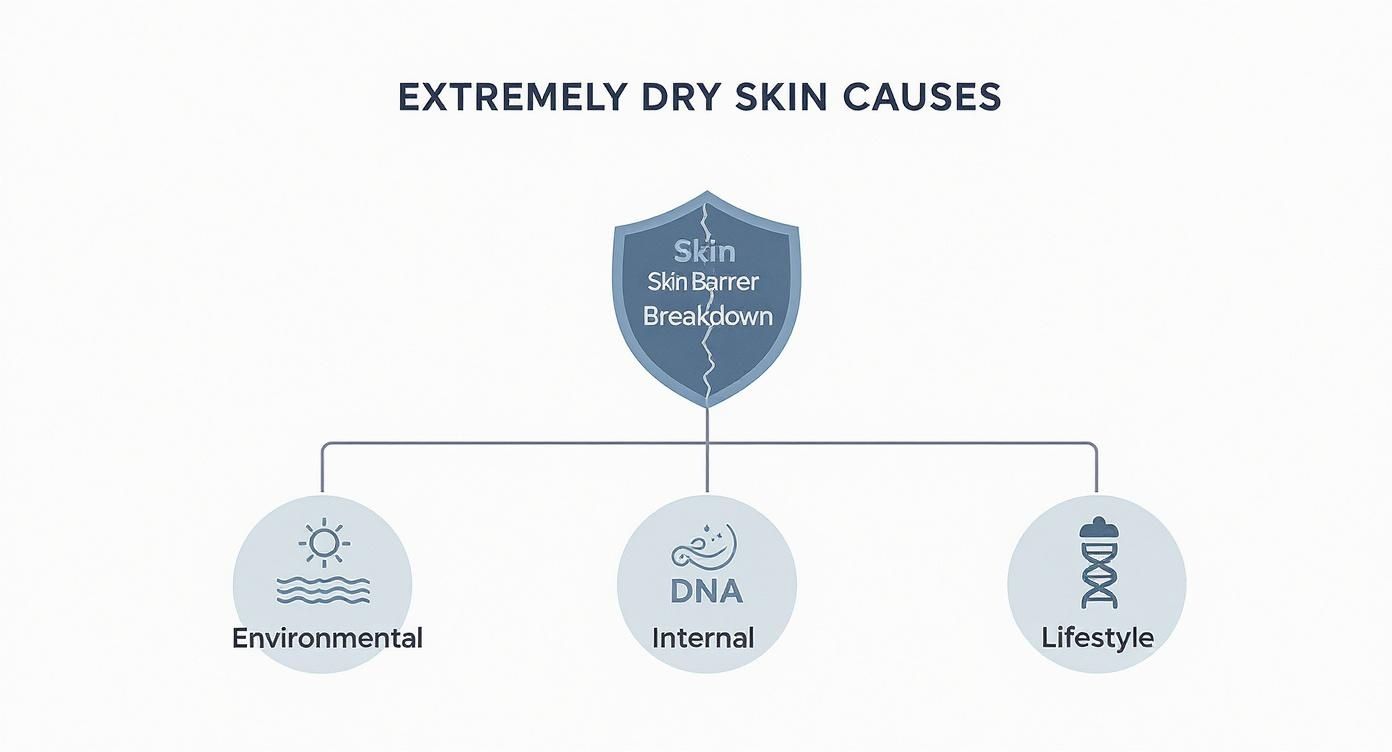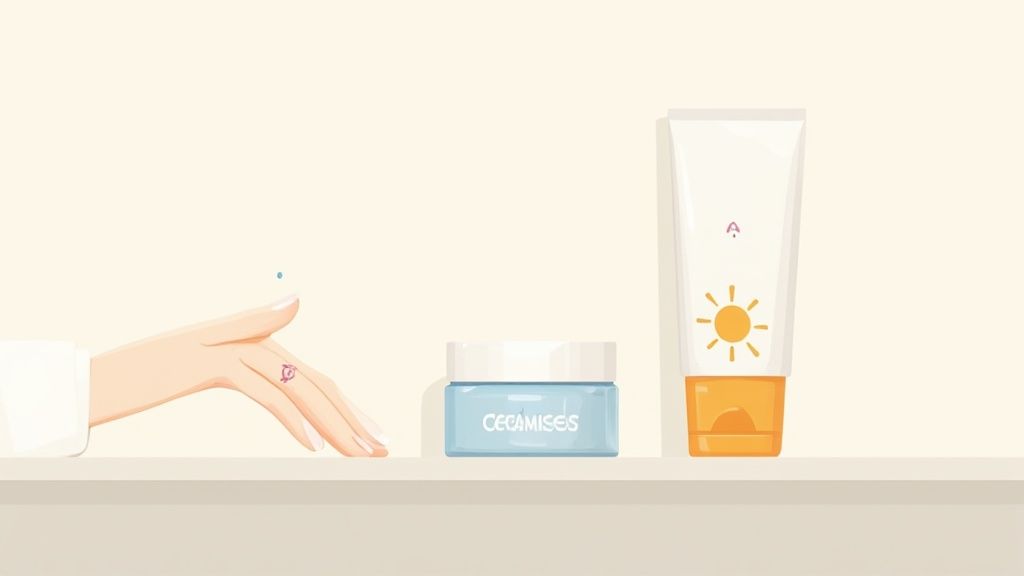When your skin feels tight, flaky, and uncomfortable, it's more than just a little dryness. What you're experiencing is a condition called xerosis, which signals a breakdown in your skin's first line of defense: the skin barrier.
What's Happening to Your Skin Barrier?
Picture your skin barrier as a sturdy brick wall. The skin cells are the "bricks," and the "mortar" holding them all together is made of natural fats, or lipids, like ceramides. A healthy, well-maintained barrier is fantastic at its job—it keeps water locked in and keeps environmental troublemakers locked out.
But when that lipid mortar starts to crumble, tiny, invisible cracks appear in the wall. This is where the problem starts. Moisture escapes, a process known as transepidermal water loss (TEWL), and irritants can now sneak in, leaving your skin feeling parched and vulnerable.
This breakdown isn't usually the result of one single issue. It's almost always a perfect storm of environmental triggers, your internal health, and your day-to-day habits.

As you can see, a compromised skin barrier is the central problem. Understanding what’s causing the damage in the first place is the key to finally getting some relief. If you're looking for a deep dive into recovery, our guide on how to repair a damaged skin barrier is a great next step.
Getting to the Root of the Problem
To really understand what's going on, it helps to group the main culprits into three buckets. Each one plays a unique role in stripping away those crucial lipids that keep your skin soft, hydrated, and resilient.
Primary Causes of Extremely Dry Skin at a Glance
This table breaks down the main factors that can weaken your skin's natural moisture barrier, leading to that persistent feeling of dryness and irritation.
| Cause Category | Key Triggers | Impact on Skin |
|---|---|---|
| Environmental Factors | Low humidity, cold air, harsh winds, UV radiation, and indoor heating/AC. | Strips natural oils from the skin's surface, accelerating moisture loss and leaving it exposed. |
| Internal Factors | Genetics, hormonal shifts, aging, and underlying conditions like eczema or psoriasis. | Can inherently weaken the skin's ability to produce or retain essential lipids and moisture. |
| Lifestyle Habits | Long, hot showers, harsh soaps, over-exfoliation, and inadequate hydration. | Systematically erodes the protective lipid barrier over time through repetitive, damaging actions. |
Understanding where your triggers fall can help you pinpoint exactly what needs to change in your routine or environment to start healing your skin.
It’s clear that dry skin is far from a rare issue. In fact, it's a widespread condition that impacts roughly 50% of the global population. On top of that, related sensitive skin conditions now affect up to 70% of people, a number that has skyrocketed by 68% in just the last two decades. This isn't just a minor annoyance; it's a significant and growing concern for a huge number of people.
How Your Environment Drains Your Skin's Moisture
You might not realize it, but your skin is in a constant battle with the world around it. Imagine your skin is like a freshly watered plant. In a humid greenhouse, it stays vibrant and dewy. But move that same plant into a dry, centrally heated room, and it quickly starts to wilt. Your skin works much the same way, fighting to hold onto every last drop of moisture.
This daily struggle is often the root cause of extremely dry, uncomfortable skin. The environment is packed with factors that can chip away at your skin's natural defenses, leaving it thirsty and vulnerable.

The Hidden Moisture Thieves Indoors and Out
You don't have to live in the Sahara to feel the effects of desert-dry air. Ironically, the very systems we use to make our homes comfortable are often what make our skin miserable.
- Indoor Heating and Air Conditioning: That cozy warmth in winter or refreshing chill in summer comes at a cost. Both central heating and AC units work by stripping humidity from the air, which in turn pulls moisture directly from your skin.
- Low-Humidity Climates: If you live in a naturally arid or cold region, the air is already working against you. When winter hits and humidity levels drop even further, the air becomes incredibly aggressive in sapping your skin's hydration.
- Harsh Winds and Cold Air: A brisk, windy day can feel invigorating, but it's hell on your skin. Wind strips away the delicate layer of natural oils that lock in moisture—a process commonly known as windburn. This erosion weakens your skin barrier, leaving it exposed and prone to cracking.
These environmental factors are a huge reason why dry skin, or xerosis, is a growing problem worldwide. As climates change, particularly in urban centers, more people are struggling. The market for treating dry skin is expected to grow by over 9.1% annually in places like Asia-Pacific by 2025, largely due to these climate-related issues. You can learn more about the global impact of environmental factors on skin health and see just how widespread this is.
Key Takeaway: The air around you is one of the biggest players in your skin's hydration game. Low humidity, whether it’s from your HVAC system or the weather outside, acts like a thief, constantly stealing moisture from your skin.
Invisible Aggressors That Weaken Your Skin
It’s not just about the air, either. Other invisible forces are quietly working to weaken your skin's defenses over time, paving the way for chronic dryness.
One of the biggest culprits is ultraviolet (UV) radiation from the sun. We all know it causes sunburn, but its damage runs much deeper. UV rays break down collagen and elastin, the very proteins that give your skin its structure and resilience. This damage compromises your skin barrier, making it far less effective at holding onto moisture.
Then there's pollution. If you live in a city, your skin is bombarded daily with a cocktail of microscopic particles and free radicals. These pollutants sit on your skin, triggering inflammation and oxidative stress. This constant assault weakens your barrier, making it leaky and unable to retain water properly. Day after day, this cumulative damage makes it incredibly difficult for your skin to stay healthy and hydrated on its own.
When Dry Skin Signals a Deeper Health Issue
Sometimes, no matter what you slather on your skin, it stays stubbornly dry, cracked, and irritated. If your usual creams and lotions just aren't cutting it, it might be a sign that the problem isn't just skin-deep. Think of extremely dry skin as your body's "check engine" light—it can be an outward symptom of an internal health issue.
It’s a bit like trying to fix a plant with yellowing leaves. You can mist those leaves all day, but if the real issue is poor soil or root rot, the plant will never get healthy. In the same way, chronic skin dryness can mean an underlying condition is getting in the way of your body's ability to maintain a strong, hydrated skin barrier from the inside out.

Common Skin Conditions Causing Dryness
For some, severe dryness isn't just a side effect—it's the main event. Certain skin conditions are defined by a compromised barrier, making chronic dryness a central part of the diagnosis.
- Eczema (Atopic Dermatitis): This is all about an overactive immune response and, often, a genetically weaker skin barrier. The skin simply can't hold onto moisture effectively, leading to that classic intense itch, redness, and flaking.
- Psoriasis: Here, the immune system gets its signals crossed and attacks healthy skin cells. This causes skin cells to multiply way too fast, creating thick, scaly patches of dry, dead skin that can be both itchy and painful.
These internal triggers are a major reason millions struggle with extremely dry skin. Eczema, for instance, affects a huge number of people—roughly 10% to 20% of children and up to 10% of adults around the world. For anyone facing this frustrating condition, natural remedies can play a supportive role. Our guide on using tallow for eczema explores a gentle, back-to-basics approach.
Key Insight: With conditions like eczema and psoriasis, the skin barrier isn't just temporarily damaged—it's fundamentally compromised. The 'mortar' holding your skin cells together is inherently weaker, turning moisture retention into a constant battle.
When Systemic Health Issues Show Up on Your Skin
Beyond specific skin disorders, other health problems can throw a wrench into the systems that keep your skin hydrated. If your skin suddenly becomes intensely dry and nothing seems to help, it’s worth considering if one of these issues could be at play.
- Thyroid Disorders: Your thyroid is the master regulator of your metabolism, which also controls your skin’s oil and sweat glands. When your thyroid is underactive (hypothyroidism), these functions can slow to a crawl, leaving your skin with far less natural moisture.
- Diabetes: High blood sugar can pull fluid from your body, leading to overall dehydration that shows up right on your skin. On top of that, the poor circulation and nerve damage that can come with diabetes often make it harder for the skin, especially on the feet and legs, to stay moisturized.
- Kidney Disease: Your kidneys are filtration powerhouses, balancing fluids and minerals. When they aren't working right, that delicate balance is lost. This can trigger severe itching and mess with your sweat and oil glands, resulting in extremely dry, uncomfortable skin.
Connecting these dots is so important. If your dry skin comes with other symptoms—like persistent fatigue, sudden weight changes, or being thirsty all the time—it’s a clear signal to check in with a doctor. They can help you get a proper diagnosis and figure out what’s really going on.
2. Daily Habits That Secretly Sabotage Your Skin
While things like genetics and the weather play a huge role, some of the most consistent damage to our skin barrier comes from our own daily routines. It's the small, seemingly harmless things we do on autopilot that can systematically strip away our skin's defenses, leading to that tight, flaky, perpetually dry feeling.
Think of your skin's natural oils as a delicate, waterproof seal. Certain common habits act like a harsh solvent, slowly dissolving this seal day after day. This cumulative damage is often the real culprit behind extremely dry skin.
The Problem with Hot Showers and Harsh Soaps
That long, steaming hot shower might feel like a gift from heaven, but it’s one of the worst offenders for dry skin. The intense heat, combined with prolonged water exposure, literally melts the lipid barrier, washing away the very oils your skin desperately needs to stay hydrated.
At the same time, many popular soaps and body washes are loaded with aggressive detergents like sulfates (SLS or SLES). These ingredients are fantastic at creating a rich lather and cutting through grease, but they’re not smart enough to distinguish between dirt and your skin’s essential fats. They just strip everything away, leaving your skin’s barrier weak and exposed.
Key Insight: A hot shower with a harsh soap is a double-assault on your skin. The heat melts away your protective oils, and the chemical detergents wash them straight down the drain, leaving your skin defenseless against moisture loss.
Hidden Irritants in Your Everyday Products
The trouble doesn't stop with your body wash. Harsh chemicals and fragrances lurk in a surprising number of products that touch your skin daily, creating a constant state of low-grade irritation that slowly undermines its protective barrier.
Here are a few common culprits to watch out for:
- Laundry Detergents: Those heavy fragrances and potent cleaning agents don't always rinse out completely. They can linger on your clothes and bedding, creating a source of constant irritation against your skin.
- Skincare with Alcohol: Be wary of products containing certain alcohols, like SD alcohol or denatured alcohol, often found in toners. They give you that quick-drying, "clean" feeling but can be incredibly dehydrating over the long haul.
- Added Fragrances: Whether it’s a synthetic perfume or a natural essential oil, fragrance is a leading cause of skin sensitization and allergic reactions. This irritation often shows up as redness, inflammation, and, you guessed it, dryness.
How Your Diet Feeds (or Starves) Your Skin
What you put in your body directly impacts your skin’s ability to build and maintain a healthy barrier. Your skin is an organ, and it needs the right nutritional building blocks to create the strong "mortar" that holds moisture in. A diet lacking in these key nutrients is a major, often overlooked, cause of extremely dry skin.
Healthy fats are non-negotiable here. Omega-3 and Omega-6 fatty acids—the kind you find in fatty fish, flaxseed, and walnuts—are essential components of your skin's lipid barrier. Without enough of them, your skin simply can't manufacture the materials needed to lock in hydration.
Likewise, antioxidant vitamins like A, C, and E are critical for skin repair and defending against environmental damage. A poor diet essentially starves your skin of the very tools it needs to protect itself.
Making a few mindful swaps in your daily routine can make a world of difference. It’s not about a total overhaul, but about replacing habits that strip moisture with ones that help preserve it.
Habit Swaps for Healthier Skin
| Common Damaging Habit | Why It Causes Dryness | Healthier Alternative |
|---|---|---|
| Long, steaming hot showers | The heat melts and strips away the skin's essential lipid barrier. | Take shorter, lukewarm showers (under 10 minutes) and pat your skin dry instead of rubbing. |
| Using harsh, high-lather soaps | Aggressive detergents like sulfates remove natural oils along with dirt. | Switch to a gentle, hydrating, and fragrance-free cleanser or soap. Look for "sulfate-free" on the label. |
| Applying moisturizer to dry skin | The product sits on top and can't effectively penetrate a dry, sealed-off surface. | Apply your moisturizer to damp skin immediately after showering to lock in the water. |
| Forgetting to hydrate from within | Dehydration reduces skin turgor and moisture from the inside out. | Drink plenty of water throughout the day and eat water-rich foods like fruits and vegetables. |
| Ignoring protective clothing | Cold winds and low humidity pull moisture directly from unprotected skin. | In cold or windy weather, wear gloves, scarves, and other protective layers to shield your skin from the elements. |
Ultimately, protecting your skin from dryness is about being a little more intentional. By understanding how these daily actions impact your skin's barrier, you can start making small changes that add up to big improvements in comfort and health.
Your Action Plan for Healthy, Hydrated Skin
Knowing what’s causing your extremely dry skin is half the battle. Now, let’s talk about how to build a smart defense. Fixing a damaged skin barrier isn't about some complicated, ten-step routine. It's actually much simpler. A consistent, gentle approach built on three key actions is all you need: cleanse mindfully, moisturize effectively, and protect your skin from the elements.
Think of it this way: this simple framework helps you rebuild the "mortar" that holds your skin cells together, patching up the cracks that let all that precious moisture escape. With the right habits and products, you can help your skin heal itself and finally lock in hydration for good.
Master the Art of Gentle Cleansing
First things first: the goal of washing your face or body is not to get it "squeaky clean." That tight, squeaky feeling is a red flag. It means you’ve just stripped away the essential fats and oils—the very lipids your skin barrier needs to function. Cleansing should feel like a gentle reset, not an aggressive scrub.
- Pick a Hydrating Cleanser: Ditch the harsh, foamy soaps that are loaded with sulfates. Instead, look for milky, creamy, or oil-based cleansers. Make sure the label says "fragrance-free" and "sulfate-free."
- Turn Down the Heat: Hot water is a huge enemy of dry skin. It literally melts away your skin’s natural protective oils. Always use lukewarm water, for both your face and body, to keep moisture loss to a minimum.
- Pat, Don't Rub: After washing, gently pat your skin with a soft towel. The trick is to leave it just a little damp, which perfectly preps it for the most important step of all.
Moisturize Like You Mean It
Moisturizing is, without a doubt, the single most powerful thing you can do to fight dryness. But here’s the secret: it’s not just what you use, but how and when you apply it.
The golden rule is to apply moisturizer to damp skin, ideally within 60 seconds of getting out of the shower or washing your face. This simple technique acts like a sealant, trapping the water on your skin's surface before it has a chance to evaporate into the air. It’s like putting a lid on a pot of boiling water—you stop the steam from escaping.
When you're choosing a product, focus on ingredients that are proven to repair the skin barrier. If you want to do a deep dive, check out our guide on the best ingredients for dry skin to see what your routine might be missing.
The Power Trio for Your Skin Barrier
- Humectants (like Hyaluronic Acid and Glycerin): These are moisture magnets. They pull water from the air and the deeper layers of your skin to hydrate the surface.
- Emollients (like Tallow and Squalane): These are the oils and lipids that smooth everything over. They fill in the tiny gaps between skin cells, making your skin feel soft and supple.
- Occlusives (like Beeswax and Lanolin): These create a physical shield on top of your skin, forming a seal that prevents moisture from getting out.
Protect Your Skin from Daily Stressors
Finally, a big part of the solution is simply creating a buffer between your skin and the environment. This means making a few small, smart adjustments to your daily life that can make a massive difference.
One of the easiest and most effective things you can do is run a humidifier in your bedroom or office. By adding moisture back into the air, a humidifier stops the dry air from constantly sucking the hydration out of your skin. This is especially helpful during the winter or if you spend a lot of time in air conditioning. This simple machine creates a more skin-friendly bubble, giving your barrier a much-needed break from its constant battle against dryness.
Knowing When to See a Dermatologist
Most of the time, you can get a handle on dry skin right at home. But sometimes, it's more stubborn than that. If you've tried everything and your skin is still screaming for relief, or if the problem has gotten severe, it’s probably time to call in a professional. Think of it like a plumbing issue—you can fix a small leak, but for a burst pipe, you call the expert.
Over-the-counter lotions and creams are fantastic first steps, but they aren’t a cure-all. If you've been slathering on a quality moisturizer for a few weeks with zero improvement, that’s your skin telling you it needs something more. A dermatologist can prescribe treatments that are far more powerful than anything you can grab off the shelf.

Red Flags That Require a Doctor's Visit
You need to listen to what your skin is telling you. Some symptoms are more than just simple dryness; they can be warning signs of an infection or a deeper health condition that needs an expert eye.
It's definitely time to book an appointment if you're dealing with any of these:
- Intense Itching: We're talking about the kind of itch that wakes you up at night or distracts you from your day. That's a major red flag.
- Deep Cracks or Bleeding: Skin that’s broken, cracked open, or bleeding is an open door for infection.
- Signs of Infection: Be on the lookout for redness, swelling, warmth around the area, or any pus.
- Widespread Scaling or Peeling: If large patches of skin are peeling away, it might point to a more significant problem.
A dermatologist does more than just write a prescription. They're a detective for your skin. They can figure out the real reason it's so dry, rule out other health issues, and build a treatment plan that’s actually meant for you. Seeing one isn't giving up; it's taking control to finally get comfortable, healthy skin.
Common Questions About Extremely Dry Skin
When you're dealing with seriously dry skin, it's easy to get lost in a sea of advice. A lot of questions pop up, and frankly, a lot of myths are floating around. Let's tackle some of the most common ones to clear things up.
"I Drink Tons of Water. Why is My Skin Still So Dry?"
This is a big one. While chugging water is fantastic for your overall health, it's usually not the silver bullet for chronically dry skin. The real problem isn't a lack of water in your body, but your skin's inability to hold onto that moisture.
Think of it this way: your skin barrier is like a brick wall. When it's healthy, the "mortar" between the "bricks" (your skin cells) is strong and keeps moisture locked in. When that barrier is compromised, it's like having cracks in the mortar. You can pour all the water you want at the wall, but it will just keep seeping out.
That's why you have to work from the outside in, too. A solid skincare routine with barrier-repairing ingredients is what patches up that mortar, allowing your skin to finally hold onto the hydration you're giving it.
Why Are My Elbows, Knees, and Heels Always So Rough?
If you feel like you're constantly fighting dry, rough patches on your elbows and knees, you're not alone. There's a biological reason for this.
The skin in these areas is built differently—it's thicker and has far fewer sebaceous (oil) glands compared to, say, your face or back. On top of that, these are high-friction zones that are always bending, stretching, and rubbing against clothes or surfaces. This constant mechanical stress combined with a natural lack of oil makes their protective barrier incredibly vulnerable to moisture loss.
Key Takeaway: It’s not just you. Areas with thicker skin and fewer oil glands, like elbows, knees, and heels, are structurally prone to becoming much drier than the rest of your body.
Are "Natural" Products Automatically Better for Dry Skin?
Not always. It's a common misconception that "natural" or "organic" means safer or more effective, especially for dry, sensitive skin. These terms aren't tightly regulated in the skincare world, so they don't guarantee a product will work for you.
In fact, many popular natural ingredients, like certain essential oils (think peppermint, citrus, or lavender), can be potent irritants that actually make dryness and sensitivity worse. Instead of getting caught up in marketing labels, focus on the ingredient list. Look for proven, skin-soothing compounds and, most importantly, always choose products that are fragrance-free.
At Wild Tallow Skincare, we focus on simple, time-tested ingredients that work with your skin's natural biology. Our formulas are handcrafted with 100% grass-fed tallow and are completely free of irritating fragrances or synthetic fillers, offering powerful relief for even the most distressed skin. See the difference for yourself at the Wild Tallow Skincare website.

